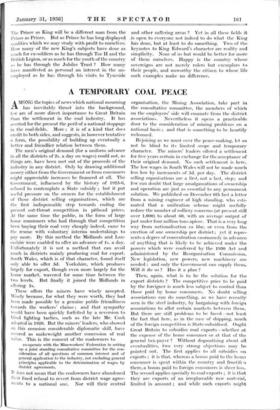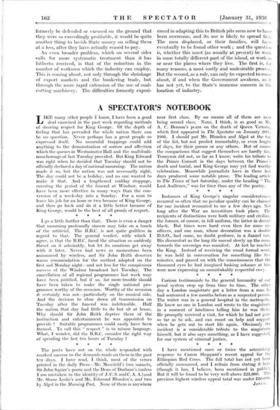A TEMPORARY COAL PEACE
AMONG the topics of news which national mourning has inevitably thrust into the background, few are of more direct importance to Great Britain than the 'settlement in the coal industry. It haS averted for the present the peril of a national stoppage in the coal-fields. More ; it is of a kind that does credit to both sides, and suggests, in however tentative a form, the possibility of building up eventually a better and friendlier relation between them.
The men's original demand (for a uniform advance in all the districts of 2s. a day on wages) could not, as things are, have been met out of the proceeds of the industry in any district. Only by draWing additional money either from the Government or from consumers might appreciable increases be financed at all. The Government; influenced by the history of 1925-6, refuSed to contemplate a State Subsidy ; but it put useful pressure on the owners for the establishment of • thoSe district selling organisations, which are the, first indispensable step towards ending the present cut-throat competition in pithead prices. At the same time the public, in the form of large home consumers who had through that competition been buYing their coal very cheaply indeed, came to the rescue with voluntary interim undertakings to pay more. By this.' method the Midlands and Lan- cashire Were enabled to offer an advance of ls. a day. UnfOrtunately it it not a method that can avail much in districts mainly producing coal for export. South. Wales, which is of that character, found itself only able to offer 5d. Yorkshire, which produces largely for export, though even more largely for the home market, wavered for some time between the two levels. But finally it joined the Midlands in offering ls.
These offers the miners have wisely accepted. Wisely because, for' what they were wOrth, they had been made possible by a genuine public friendliness towards the workers' claims ; and that sympathy would have been quickly forfeited by a reversion to blind fighting tactics, such as the late Mr. Cook adopted in 1926. But the miners' leaders, who showed on this occasion considerable diplomatic skill, have secured as makeweight another concession of real value. This is the consent of the coalowners to co-operate with the Mineworkers' Federation in setting up a joint standing consultative committee for the con- sideration of all questions of common interest and of general application to the industry, not excluding general principles applicable to the determination of wages by district agreements.
It does not mean that the coalowners have abandoned their fixed refusal to revert from district wage agree- ments .to a national one-. Nor will their Central organisation, the Mining Association, take part in the consultative committee, the members of which on the employers' side will emanate from the district associations. Nevertheless it opens a practicable door to the consideration of mining problems' on a national basis ; and that is something to be heartily welcomed.
Rejoicing as we must over the peace-making, let us not be blind to its limited scope and temporary character. The miners' leaders offered a settlement for five years certain in exchange for the acceptance of their original demand. No such settlement is here. The low wages in South Wales will not be made much less low by increments of 5d. per day. The district selling organisations arc a first, not a last, step ; and few can doubt that large amalgamation's of ownership and operation are just as essential to any permanent solution. We published on December 6th last a letter from a mining engineer of high standing, who esti7 mated that a unification scheme might usefully reduce the number of colliery concerns (at present still over 1,000) to about 60, with an average output of just under four million tons apiece. That is a very long way from nationalisation en bloc, or even from the erection of one ownership per district ; yet it repre- sents a degree of concentration enormously in advance of anything that is likely to be achieved under 'the powers which were conferred by the 1930 Act and administered by the Reorganisation Commission. New legislation, new powers, new machinery are needed ; and only the Government can supply them. Will it do so ? Has it a plan ?
Then, again, what is to be the solution for the export districts ? The competitive price to be paid by the foreigner is much less subject to control than those paid by home consumers. No doubt selling associations can do something, as we have recently seen in the steel industry, by bargaining with foreign associations to allot certain markets between them. But there are stiff problems to be faced—not least the fact that here, as in the case of shipping, much of the foreign competition is State-subsidised. Ought Great Britain to subsidise coal exports–Lwhether at the expense of the home consumer or at that of the general tax-payer ? Without dogmatising about all eventualities, two very strong objections may , be pointed out. The first applies to all subsidies on exports ; it is that, whereas a bonus paid to the home consumer is spent within the country and fructifies there, a bonus paid to foreign consumers is sheer loss. The second applies specially to coal exports ; it is that they are exports of an irreplaceable raw material, limited in amount ; and while such exports might formerly be defended or excused on the ground that they were so exceedingly profitable, it would be quite, another thing to lavish State money on selling them at a loss, after they have actually ceased to pay.
An even broader problem, which on several sides calls for more systematic treatment than it has hitherto received, is that of the reduction in the number of workmen which the industry can employ. This is coming about, not only through the shrinkage of export markets and the bunkering trade, but through the more rapid extension of the use of coal- cutting machinery. The difficulties formerly experi- enced in adapting this to British pits seem now to have been .overeome, and its use is likely. to spread fast. The men displaced, or their families, will have eventually to be found other work ; and the question is, .whether this must (as usually at present) be work in some totally different part of the island, or work ill or near the places where they live. The first is, for many reasons, a most costly and undesirable process.. But the second, as a rule, can only be expected to come about, if and when the Government awakens, as it has not yet, to the State's immense concern in the location of industry."











































 Previous page
Previous page